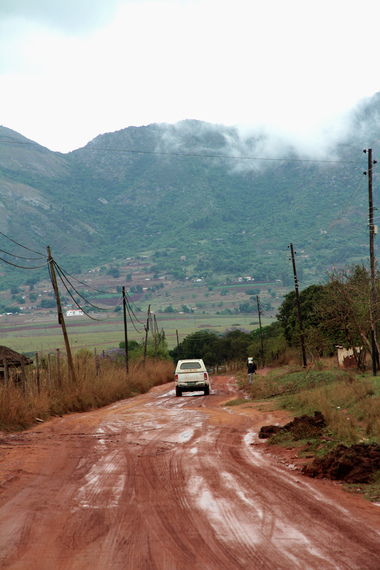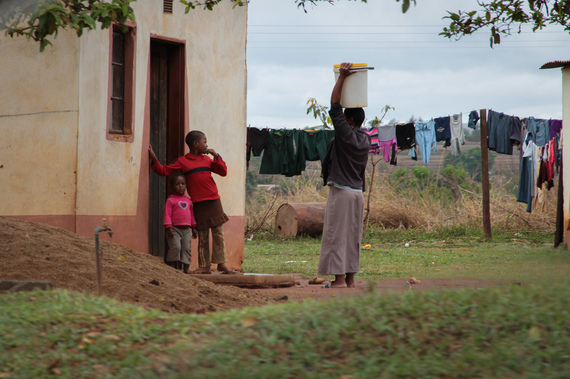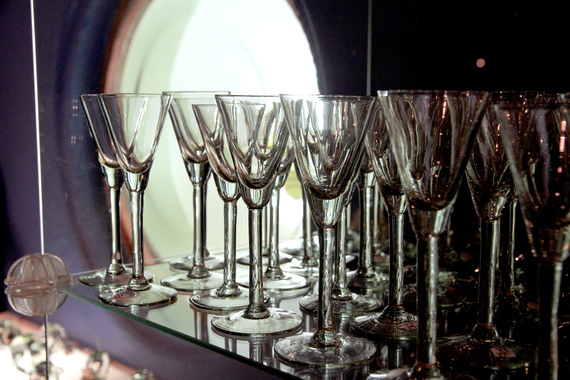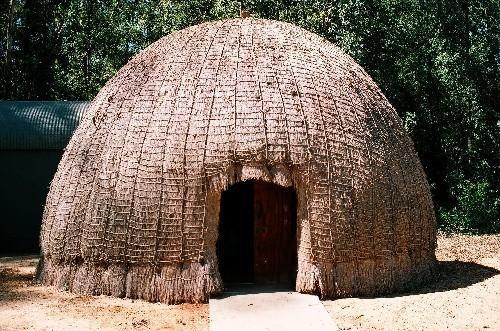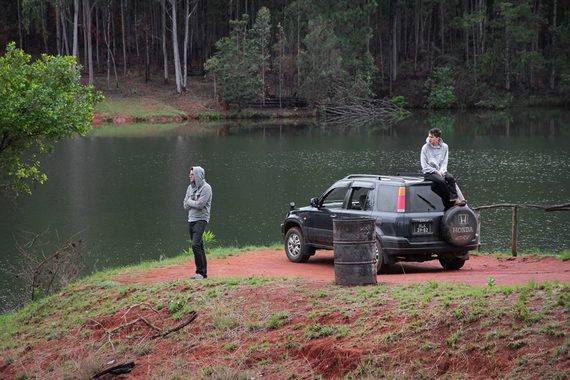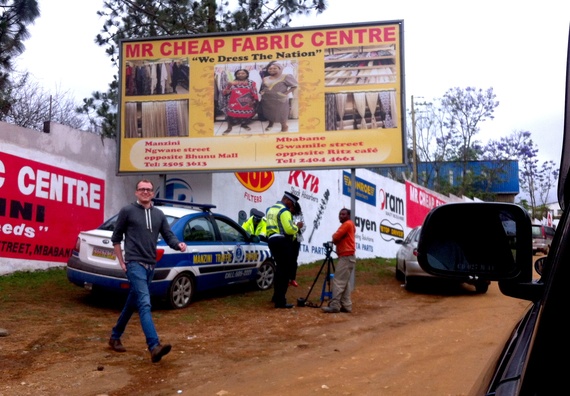Our direction is uncertain without the reassuring blue dot on our iPhones. Leaving behind South Africa, a group of bright-eyed New Yorkers and I climb into the dense fog blanketing the border of the Kingdom of Swaziland. Stepping out of our Honda CRV, we enter the Goba border checkpoint, where a computer-less customs official logs us into the country. A framed picture of Swaziland's current King, Mswati III, stares down at us from a bare wall.
Swaziland, a tiny, landlocked country in Southern Africa, is roughly the size of New Jersey. Ruled by King Mswati III, Swaziland is the last standing absolute monarchy in Africa. Mswati, with 14 wives and 23 children, rules the country by decree, solely appointing top government officials, including the prime minister. The king and his government have a large task at hand, however, as Swaziland is stricken by vast economic disparity and the highest HIV infection rate in the world: 25.8 percent.
As our mud-covered car begins its decent further into Swaziland, the paved and well-marked South African roads seem decades behind us. Ten minutes into our trip and already convinced we're on the wrong road, we're suddenly overtaken by a speeding white BMW. As quickly as it appeared, the luxury sedan disappears into the evergreen before us. The BMW, a welcomed reassurance of our map-reading skills, is also a fleeting signal of Swaziland's imbalanced political and economic landscape.
As King Mswati rules the country by decree, many governmental and non-governmental organizations have condemned the king and implored him to adopt a series of constitutional reforms to pave the way for a more democratic system of governance. Additionally, Mswati is highly criticized for his vast personal wealth. With 60 percent of the population living on less than $1.25 per day, Forbes estimated Mswati's net worth to be around $200 million in 2009.
--
Our SUV rolls through the endless fog and into the town of Piggs Peak, where we get our first glimpse of Swazi life. Out the rainy windows, we watch the lush evergreen forest transform into a sea of stumps. Blackened logs in piles on the sides of the roads are sprayed with water, despite the relentless mist, by groups of men in raincoats -- a process used to reduce cracking and shrinkage of the logs. The dense fog and high elevation breed a terrain ideal forestry, the area's largest industry.
We make an unsignaled left out of Piggs Peak and toward our next stop, the Ngwenya Glass Factory. As the fog begins to break, we become aware of our new surroundings. The topography has shifted and, out of the forest, rolling acres of farmland allow us our first views of the sprawling countryside. Women balancing heavy loads walk alongside the roads, as men in groups of all ages appear to be telling stories and working in the fields on a late Thursday afternoon. Still today, three-quarters of the Swazi population make their livelihoods practicing subsistence agriculture -- another stark reminder of the country's income disparity. The women alongside the road begin to blur as we pick up speed in approach to Ngwenya. We pull into the parking lot, dodging a few wild peacocks, a few minutes too late for lunch.
We're greeted with a chorus of "hello" as we spiral down the staircase and into the factory. It's impossible not to immediately notice the amount of stunning glass-blown figurines, from elephants to egrets, wine glasses, and other glassware lining the shop's walls. While browsing the captivating miniature glass zoo, we're given a brief history of the Ngwenya Glass Factory by a member of the staff.
Established in 1979 with help from Swedish aid, the factory has historically been a large employer of Swazi locals. The Swedish imported both materials and techniques, passed on to the Swazi who have since taken over the control. Today, every piece the Ngwenya Glass Factory produces is made solely from litter collected on the sides of the roads we've been bumping along since morning. Ngwenya has become both an iconic stop for tourists as well as a valuable asset for the local communities. In addition to providing training and jobs, Ngwenya aims to inspire a sense of environmentalism in local children by sponsoring school activities and sports teams.
After purchasing an early Christmas present for mom, we spiral back out of Ngwenya, dodging a few more peacocks, and make for our night's accommodations inside of the nearby Mlilwane Wildlife Sanctuary.
Dusk has settled when we arrive at Mlilwane. Pulling up to the night gate, we're approached by the night guard who asks us both our destination and, more surprisingly, if we would like to purchase marijuana. Swazi Gold, a highly potent and valuable strain of marijuana, is greatly desired in neighboring South Africa, prompting many Swazi to grow the crop as an alternative source of income. The guard informs us that dagga, the local colloquialism, would be arriving the next afternoon. Unfortunately, we'd be gone by the time the Gold arrived, but perhaps it's the perfect excuse for a return trip.
In the darkness we walk through the wildlife sanctuary to the traditional Swazi beehive hut we'd be staying in for the night. The beehive hut is constructed by weaving grass through a domelike frame of saplings. The structure is well suited for the climate of Swaziland: staying warm in the winter months, cool in the summer months, and waterproof year round. The latter, a blessing, as the rain begins to patter down harder as night falls. After a brief argument about the origin of the mouse and/or bat droppings covering the sheets, we fall asleep to the breathtaking refrain of crickets. We are certainly no longer in New York.
As the sun rises, we crawl out of our beehive home and after a quick breakfast, we jump eagerly back into our CRV and set out to explore. Mlilwane, like many reserves in Swaziland, allows for self guided tours. Cameras in hand, we set out to the promise of klout-changing Facebook photos.
Swaziland may be the size of New Jersey, but certainly doesn't smell like it; the incredible aroma of fresh eucalyptus is overwhelming as we pass by wild zebra, boar, antelope, crocodile, and hippopotamus driving further into the wildlife area.
After a few hours of bliss, we roll out of Mlilwane heading for the Mozambican border to the east. The dearth of traffic prompts us to roll the windows down, blast the music, and our speed. Naturally, as we enter into Manzini, one of the largest cities in Swaziland, a police officer hand-motions for us to pull over and we timidly oblige, slowing down and parking on the side of the road. Sean, our fearless and lead-footed driver, is asked to step out of the car. From the backseat, a broken conversation, perhaps more accurately described as sign language, can be seen/heard. After a few minutes, an audible yell prompts us to hesitantly roll down the window to eavesdrop.
"Barack Obama! [...] New York! [...] Friends!" are the only words I'm able to make out as the police officer pats Sean on the back and motions for him to be on his way. A bit perplexed, Sean re-enters the driver's seat and we drive out of Manzni, ticket-free, at a much slower pace.
As dawn falls, we cross the border to Mozambique already eager to return. Swaziland has an undeniable magic that we are saddened to leave behind. Exhausted from the day's activities, I reach instinctively into my pocket and pull out my iPhone. But before opening Google Maps to check our location, I put my phone in the glove compartment and close it.
Photos by Sean Devaney - Seandevaney.com
